双音节单词
- 格式:doc
- 大小:16.00 KB
- 文档页数:1
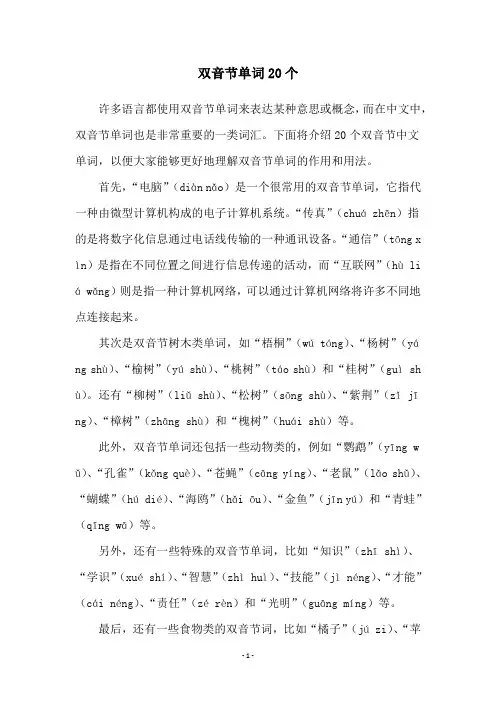
双音节单词20个许多语言都使用双音节单词来表达某种意思或概念,而在中文中,双音节单词也是非常重要的一类词汇。
下面将介绍20个双音节中文单词,以便大家能够更好地理解双音节单词的作用和用法。
首先,“电脑”(diàn nǎo)是一个很常用的双音节单词,它指代一种由微型计算机构成的电子计算机系统。
“传真”(chuá zhēn)指的是将数字化信息通过电话线传输的一种通讯设备。
“通信”(tōng x ìn)是指在不同位置之间进行信息传递的活动,而“互联网”(hù li á wǎng)则是指一种计算机网络,可以通过计算机网络将许多不同地点连接起来。
其次是双音节树木类单词,如“梧桐”(wú tóng)、“杨树”(yáng shù)、“榆树”(yú shù)、“桃树”(táo shù)和“桂树”(guì sh ù)。
还有“柳树”(liǔ shù)、“松树”(sōng shù)、“紫荆”(zǐ jīng)、“樟树”(zhāng shù)和“槐树”(huái shù)等。
此外,双音节单词还包括一些动物类的,例如“鹦鹉”(yīng w ǔ)、“孔雀”(kǒng què)、“苍蝇”(cāng yíng)、“老鼠”(lǎo shǔ)、“蝴蝶”(hú dié)、“海鸥”(hǎi ōu)、“金鱼”(jīn yú)和“青蛙”(qīng wā)等。
另外,还有一些特殊的双音节单词,比如“知识”(zhī shì)、“学识”(xué shí)、“智慧”(zhì huì)、“技能”(jì néng)、“才能”(cái néng)、“责任”(zé rèn)和“光明”(guāng míng)等。
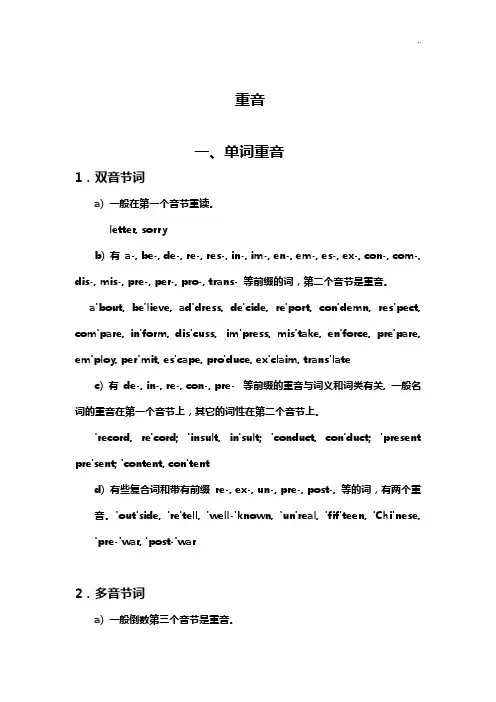
重音一、单词重音1.双音节词a) 一般在第一个音节重读。
letter, sorryb) 有a-, be-, de-, re-, res-, in-, im-, en-, em-, es-, ex-, con-, com-, dis-, mis-, pre-, per-, pro-, trans- 等前缀的词,第二个音节是重音。
a'bout, be'lieve, ad'dress, de'cide, re'port, con'demn, res'pect, com'pare, in'form, dis'cuss, im'press, mis'take, en'force, pre'pare, em'ploy, per'mit, es'cape, pro'duce, ex'claim, trans'latec) 有de-, in-, re-, con-, pre- 等前缀的重音与词义和词类有关, 一般名词的重音在第一个音节上,其它的词性在第二个音节上。
'record, re'cord; 'insult, in'sult; 'conduct, con'duct; 'present pre'sent; 'content, con'tentd) 有些复合词和带有前缀re-, ex-, un-, pre-, post-, 等的词,有两个重音。
'out'side, 're'tell, 'well-'known, 'un'real, 'fif'teen, 'Chi'nese, 'pre-'war, 'post-'war2.多音节词a) 一般倒数第三个音节是重音。
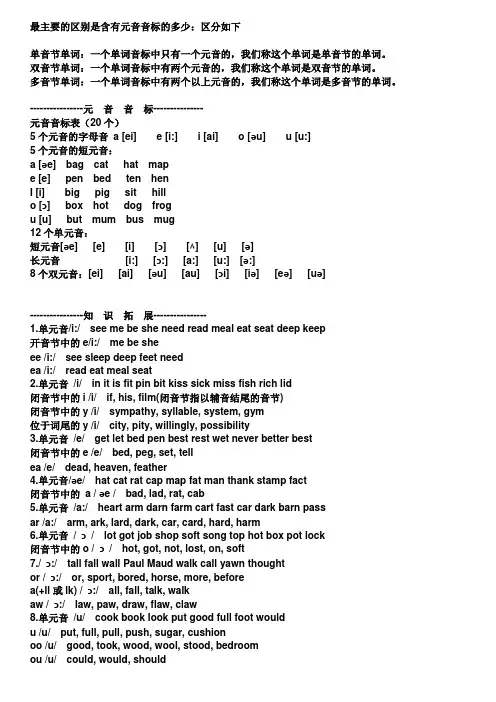
最主要的区别是含有元音音标的多少:区分如下单音节单词:一个单词音标中只有一个元音的,我们称这个单词是单音节的单词。
双音节单词:一个单词音标中有两个元音的,我们称这个单词是双音节的单词。
多音节单词:一个单词音标中有两个以上元音的,我们称这个单词是多音节的单词。
----------------元音音标---------------元音音标表(20个)5个元音的字母音a [ei] e [i:] i [ai] o [əu] u [u:]5个元音的短元音:a [əe] bag cat hat mape [e] pen bed ten henI [i] big pig sit hillo [כ] box hot dog frogu [u] but mum bus mug12个单元音:短元音[əe] [e] [i] [כ] [۸] [u] [ə]长元音[i:] [כ:] [a:] [u:] [ə:]8个双元音:[ei] [ai] [əu] [au] [כi] [iə] [eə] [uə]----------------知识拓展----------------1.单元音/i:/ see me be she need read meal eat seat deep keep开音节中的e/i:/ me be sheee /i:/ see sleep deep feet needea /i:/ read eat meal seat2.单元音/i/ in it is fit pin bit kiss sick miss fish rich lid闭音节中的i /i/ if, his, film(闭音节指以辅音结尾的音节)闭音节中的y /i/ sympathy, syllable, system, gym位于词尾的y /i/ city, pity, willingly, possibility3.单元音/e/ get let bed pen best rest wet never better best闭音节中的e /e/ bed, peg, set, tellea /e/ dead, heaven, feather4.单元音/əe/ hat cat rat cap map fat man thank stamp fact闭音节中的 a / əe / bad, lad, rat, cab5.单元音/a:/ heart arm darn farm cart fast car dark barn passar /a:/ arm, ark, lard, dark, car, card, hard, harm6.单元音/ כ/ lot got job shop soft song top hot box pot lock闭音节中的o / כ/ hot, got, not, lost, on, soft7./ כ:/ tall fall wall Paul Maud walk call yawn thoughtor / כ:/ or, sport, bored, horse, more, beforea(+ll或lk) / כ:/ all, fall, talk, walkaw / כ:/ law, paw, draw, flaw, claw8.单元音/u/ cook book look put good full foot wouldu /u/ put, full, pull, push, sugar, cushionoo /u/ good, took, wood, wool, stood, bedroomou /u/ could, would, should9.单元音/u:/ too soon rule boot fool school soup cool lose newoo /u:/ fool, booth, room, foodou /u:/ soup, you, groupo /u:/ do, to, who10./ ۸/ cup bus gun hut sung duck lung luck cut stuck闭音节中的u /۸/ but, hunt, sun, duck, luck闭音节中的o /۸/ son, once, colour, other, moneyou /۸/ rough, enough, touch, cousin, young11.单元音/ə:/ shirt hunt burn girl bird nurse work worm curseer /ə:/ herd, verb, mercyir /ə:/ thirty, shirt, third, firur /ə:/ turn, church, burn, nurse, curseor /ə:/ word, work, world, worseear /ə:/ heard, earth, search12.单元音/ə/ ago about asleep above again among mother brother 许多元音在非重读章节中读成/ə/,所以/ə/的拼写形式多种多样。
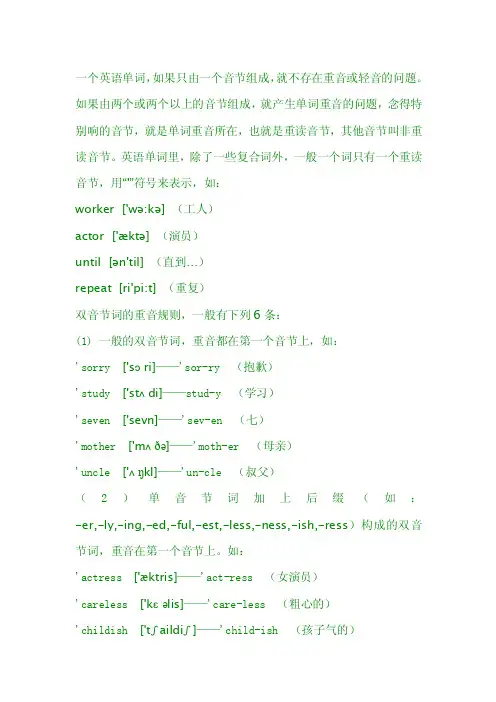
一个英语单词,如果只由一个音节组成,就不存在重音或轻音的问题。
如果由两个或两个以上的音节组成,就产生单词重音的问题,念得特别响的音节,就是单词重音所在,也就是重读音节,其他音节叫非重读音节。
英语单词里,除了一些复合词外,一般一个词只有一个重读音节,用“'”符号来表示,如:worker ['wə:kə] (工人)actor ['æktə] (演员)until [ən'til] (直到…)repeat [ri'pi:t] (重复)双音节词的重音规则,一般有下列6条:(1) 一般的双音节词,重音都在第一个音节上,如:'sorry ['sɔri]——'sor-ry (抱歉)'study ['stʌdi]——stud-y (学习)'seven ['sevn]——'sev-en (七)'mother ['mʌðə]——'moth-er (母亲)'uncle ['ʌŋkl]——'un-cle (叔父)(2)单音节词加上后缀(如:-er,-ly,-ing,-ed,-ful,-est,-less,-ness,-ish,-ress)构成的双音节词,重音在第一个音节上。
如:'actress ['æktris]——'act-ress (女演员)'careless ['kɛəlis]——'care-less (粗心的)'childish ['tʃaildiʃ]——'child-ish (孩子气的)'interesting ['intəristiŋ]——'interest-ing (有趣的)'quickly ['kwikli]——'quick-ly (快)'tallest ['tɔ:list]——'tall-est (最高的)'teacher ['ti:tʃə]——'teach-er (教师)'useful ['ju:sfəl]——'use-ful (有用的)(3)单音节词加上前缀(如:a-,be-,com-,con-,de-,dis-,em-,en-,es-,im-,in-,mis-,pre-,p er-,pro-,re-,trans-)构成的双音节词,重音往往在第二个音节上,如:a'lone [ə'ləun]——a-'lone (单独地)be'side [bi'said]——be-'side (在...旁边)com'pare [kəm'pɛə]——com-'pare (比较)con'nect [kə'nekt]——con-'nect (连接)de'mand [di'mɑ:nd]——de-'mand (要求)dis'cuss [di'skʌs]——dis-'cuss (讨论)en'large [in'lɑ:dʒ]——en-'large (扩大)es'cape [is'keip]——es-'cape (逃跑)ex'plain[iks'plein]——ex-'plain (解释)im'port [im'pɔ:t]——im-'port (进口)in'crease [in'kri:s]——in-'crease (增加)mis'take [mi'steik]——mis-'take (错误)per'mit [pə'mit]——per-'mit (允许)pre'pare [pri'pɛə]——pre-'pare (准备)pro'pose [prə'pəuz]——pro-'pose (建议)re'peat [ri'pi:t]——re-'peat (重复)trans-late [træns'leit]——trans-'late (翻译)(4) 以con-,de-,ex-,in-,re-,pre-,pro-等为前缀的双音节词,在作名词用时,重音在第一个音节上,作动词用时重音在第二个音节上,如下列词用作名词和动词时的对比:【con'tent [kən'tent]v.——con-'tent (满足)'content ['kɔntənt]n.——'con-tent (内容)】【'desert ['dezət]n.——'des-ert (沙漠)de'sert [di'zə:t]v.——de-'sert (抛弃)】【'export ['ekspɔ:t]n.——'ex-port (出口)ex'port [ɪks'pɔ:t]v.——ex-'port (出口)】【'insult ['insʌlt]n.——'in-sult (侮辱)in'sult [in'sʌlt]v.——in-'sult (侮辱)】【'present ['preznt]n.——'pres-ent (礼物)pre'sent [pri'zent]v.——pre-'sent (呈现)】【'produce ['prɔdju:s]n.——'prod-uce (产品)pro'duce [prə'dju:s]v.——pro-'duce (生产)】【'refuse ['r e fju:s]n.——'ref-use (废物)re'fuse [ri'fju:z]v.——re-'fuse (拒绝)】(5)有一些复合词,是带有含意的前缀,如ex-(前任),pre-(前),post-(后),re-(再),un-(不)等构成的双音节词,可以有两个重音。
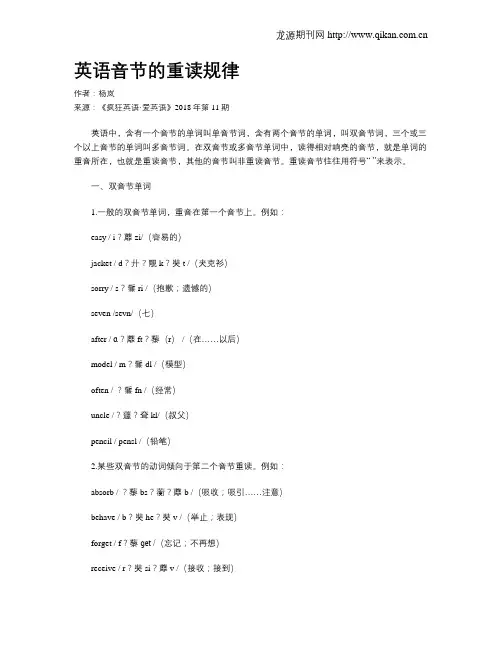
英语音节的重读规律作者:杨岚来源:《疯狂英语·爱英语》2018年第11期英语中,含有一个音节的单词叫单音节词,含有两个音节的单词,叫双音节词,三个或三个以上音节的单词叫多音节词。
在双音节或多音节单词中,读得相对响亮的音节,就是单词的重音所在,也就是重读音节,其他的音节叫非重读音节。
重读音节往往用符号“ ”来表示。
一、双音节单词1.一般的双音节单词,重音在第一个音节上。
例如:easy / i?蘼zi/(容易的)jacket / d?廾?覸k?奘t /(夹克衫)sorry / s?鬑ri /(抱歉;遗憾的)seven /sevn/(七)after / ɑ?蘼ft?藜(r) /(在……以后)model / m?鬑dl /(模型)often / ?鬑fn /(经常)uncle /?蘧?耷kl/(叔父)pencil / pensl /(铅笔)2.某些双音节的动词倾向于第二个音节重读。
例如:absorb / ?藜bs?蘅?蘼b /(吸收;吸引……注意)behave / b?奘he?奘v /(举止;表现)forget / f?藜ɡet /(忘记;不再想)receive / r?奘si?蘼v /(接收;接到)3.单音节单词加上后缀(如:?鄄en、?鄄er、?鄄ly、?鄄ing、?鄄ed、?鄄ful、?鄄est、?鄄less、?鄄ness、?鄄ish、?鄄ress、?鄄ow等)所构成的双音节单词,重音在第一个音节上。
例如:actress /?覸ktr?藜s /(女演员)careless / ke?藜l?藜s / (粗心的)illness / ?奘ln?藜s /(疾病;病)interesting / ?奘ntr?藜st?奘?耷 /(有趣的)quickly / kw?奘kli /(迅速地)tallest / t?蘅?蘼l?奘st /(最高的)worker / w?誻?蘼k?藜(r) /(工人;工作者)useful / ju?蘼sfl/ (有用的;有益的)wanted / w?鬑nt?奘d /(受通缉的)happen / h?覸p?藜n/ (发生;出现)yellow / jel?藜?尬 /(黄色的)4.由单音节单词加上前缀(如:a?鄄、be?鄄、com?鄄、con?鄄、de?鄄、dis?鄄、em?鄄、en?鄄、es?鄄、im?鄄、in?鄄、mis?鄄、pre?鄄、per?鄄、pro?鄄、re?鄄、trans?鄄等)构成的双音节单词,重音往往在第二个音节上。
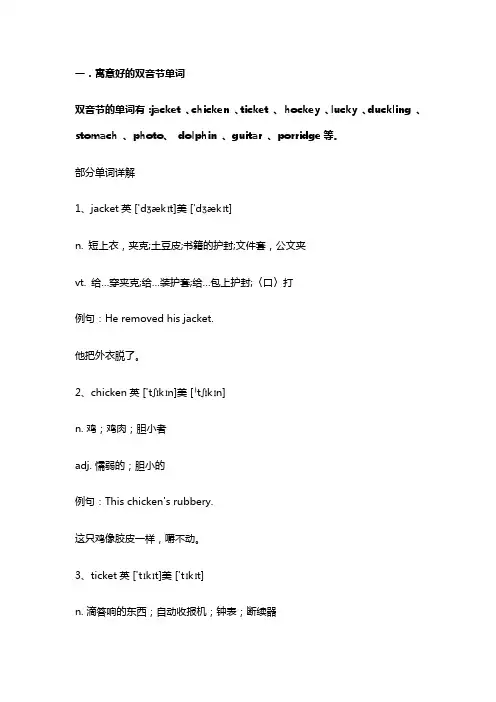
一.寓意好的双音节单词双音节的单词有:jacket 、chicken 、ticket 、hockey 、lucky 、duckling 、stomach 、photo、dolphin 、guitar 、porridge等。
部分单词详解1、jacket英 ['dʒækɪt]美 ['dʒækɪt]n. 短上衣,夹克;土豆皮;书籍的护封;文件套,公文夹vt. 给…穿夹克;给…装护套;给…包上护封;〈口〉打例句:He removed his jacket.他把外衣脱了。
2、chicken英 ['tʃɪkɪn]美 [ˈtʃɪkɪn]n. 鸡;鸡肉;胆小者adj. 懦弱的;胆小的例句:This chicken's rubbery.这只鸡像胶皮一样,嚼不动。
3、ticket英 ['tɪkɪt]美 ['tɪkɪt]n. 滴答响的东西;自动收报机;钟表;断续器[例句]That's the ticket.那正是所需要的东西。
4、hockey英 ['hɒkɪ]美 ['hɑki]n.曲棍球[例句]Great Britain's hockey players were outmanoeuvred by Germany. 德国曲棍球队智取英国队。
5、lucky英 ['lʌkɪ]美 ['lʌki]adj. 幸运的;侥幸的[例句]I'd been devilish lucky.我真是太幸运了。
扩展资料:双音节简单说,每个元音构成一个音素,或者说是一个音节。
双音节就是有两个元音的单词,三个或者三个音节以上的词称为多音节词。
1、有几个元音就有几个音节,如:girl 只有一个元音就一个音节,baby有两个元音就是双音节,hospital有三个元音,就三个音节。
2、辅音和鼻辅音,舌侧音可组成音节如:apple,双音节,其中ppl单独是一个音节;socialism 四个音节,其中sm单独是一个音节。
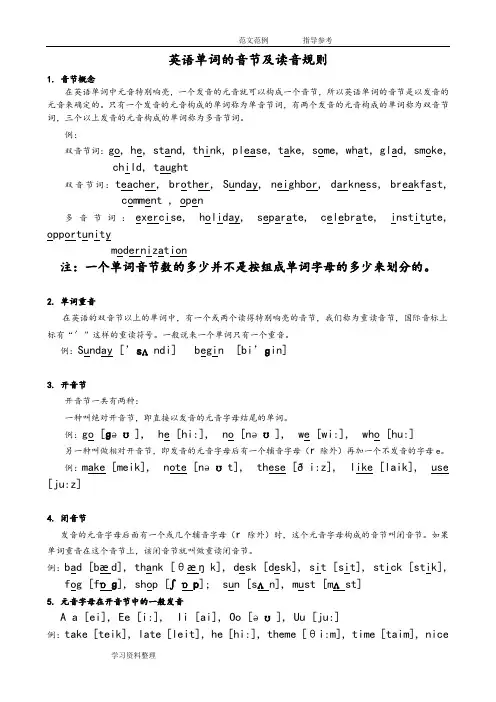
英语单词的音节及读音规则1. 音节概念在英语单词中元音特别响亮,一个发音的元音就可以构成一个音节,所以英语单词的音节是以发音的元音来确定的。
只有一个发音的元音构成的单词称为单音节词,有两个发音的元音构成的单词称为双音节词,三个以上发音的元音构成的单词称为多音节词。
例:双音节词:go, he, stand, think, please, take, some, what, glad, smoke, child, taught双音节词:teacher, brother, Sunday, neighbor, darkness, breakfast, comment , open多音节词:exercise, holiday, separate, celebrate, institute, opportunitymodernization注:一个单词音节数的多少并不是按组成单词字母的多少来划分的。
2. 单词重音在英语的双音节以上的单词中,有一个或两个读得特别响亮的音节,我们称为重读音节,国际音标上标有“′”这样的重读符号。
一般说来一个单词只有一个重音。
例:Sunday [’sʌndi] begin [bi’ɡin]3. 开音节开音节一共有两种:一种叫绝对开音节,即直接以发音的元音字母结尾的单词。
例:go [ɡəʊ], he [hi:], no [nəʊ], we [wi:], who [hu:]另一种叫做相对开音节,即发音的元音字母后有一个辅音字母(r除外)再加一个不发音的字母e。
例:make [meik], note [nəʊt], these [ði:z], like [laik], use [ju:z]4. 闭音节发音的元音字母后面有一个或几个辅音字母(r除外)时,这个元音字母构成的音节叫闭音节。
如果单词重音在这个音节上,该闭音节就叫做重读闭音节。
例:bad [bæd], thank [θæŋk], desk [desk], sit [sit], stick [stik], fog [fɒɡ], shop [ʃɒp]; sun [sʌn], must [mʌst]5. 元音字母在开音节中的一般发音A a [ei], Ee [i:], Ii [ai], Oo [əʊ], Uu [ju:]例:take [teik], late [leit], he [hi:], theme [θi:m], time [taim], nice[nais], no [nəʊ]; joke [jəʊk], tune [tju:n], cute [kju:t];6. 元音字母在重读闭音节中的一般发音A a [æ], Ee [e], Ii [i], Oo [ɒ], Uu [ʌ]例:lamp [læmp], plan [plæn], well [wel], best [best], mill [mil], wish [wiʃ], hot [hɒt]; drop [drɒp], club [clʌb], but [bʌt]7. 各元音在开音节和闭音节的读音规则1)A a开音节中多读[ei] 字母本身的音。
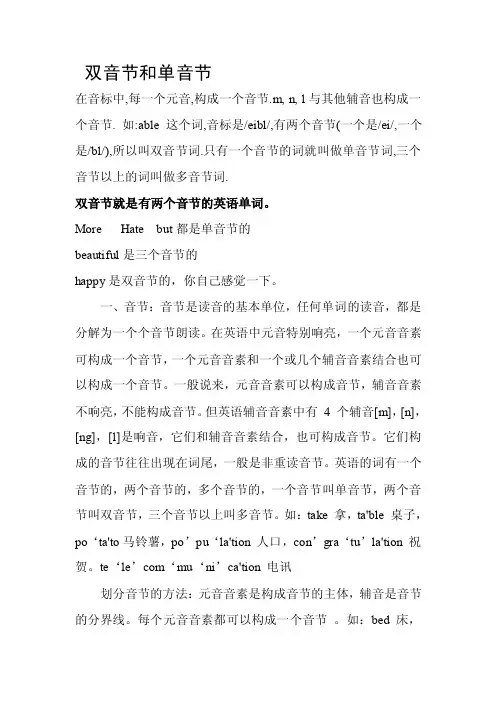
双音节和单音节在音标中,每一个元音,构成一个音节.m, n, l与其他辅音也构成一个音节. 如:able这个词,音标是/eibl/,有两个音节(一个是/ei/,一个是/bl/),所以叫双音节词.只有一个音节的词就叫做单音节词,三个音节以上的词叫做多音节词.双音节就是有两个音节的英语单词。
More Hate but都是单音节的beautiful是三个音节的happy是双音节的,你自己感觉一下。
一、音节:音节是读音的基本单位,任何单词的读音,都是分解为一个个音节朗读。
在英语中元音特别响亮,一个元音音素可构成一个音节,一个元音音素和一个或几个辅音音素结合也可以构成一个音节。
一般说来,元音音素可以构成音节,辅音音素不响亮,不能构成音节。
但英语辅音音素中有4 个辅音[m],[n],[ng],[l]是响音,它们和辅音音素结合,也可构成音节。
它们构成的音节往往出现在词尾,一般是非重读音节。
英语的词有一个音节的,两个音节的,多个音节的,一个音节叫单音节,两个音节叫双音节,三个音节以上叫多音节。
如:take 拿,ta'ble 桌子,po‘ta'to马铃薯,po’pu‘la'tion 人口,con’gra‘tu’la'tion 祝贺。
te‘le’com‘mu‘ni’ca'tion 电讯划分音节的方法:元音音素是构成音节的主体,辅音是音节的分界线。
每个元音音素都可以构成一个音节。
如:bed 床,bet 打赌,seat 坐位,beat 毒打,beaut 极好的beau'ty 美。
两元音音素之间有一个辅音音素时,辅音音素归后一音节,如:stu'dent 学生,la'bour 劳动。
有两个辅音音素时,一个辅音音素归前一音节,一个归后一音节,如:win'ter 冬天fa'ther 父亲,tea'cher 教师。
1)音节按读音可以分为开音节和闭音节开音节又可以分为绝对开音节和相对开音节(1) 绝对开音节:是指一个元音音素后面没有辅音音素而构成的音节,例如:we, hi, yo-yo(2) 相对开音节:是指一个元音音素后面有一个辅音音素(除r)之外,最后是一个不发音的e字母构成的音节,如:take, make 在开音节中,这个元音字母发“字母”本身音,例如hi|hai|, use|ju:z| (3) 闭音节:指元音字母后面有辅音字母(辅音字母r除外)构成的音节,如:leg, cross2)音节按重读可以分为重读音节和非重读音节重读音节:指在双音节或多音节词中有一个发音特别响亮的音节,叫重读音节,用重音符号“`”标于相应位置,其他音节为非重读音节,如begin |be’gin|,单音节词作重读处理,但不标重音符号.中国汉语音韵学中,一个汉字音节,则包括声母、韵母、字调。
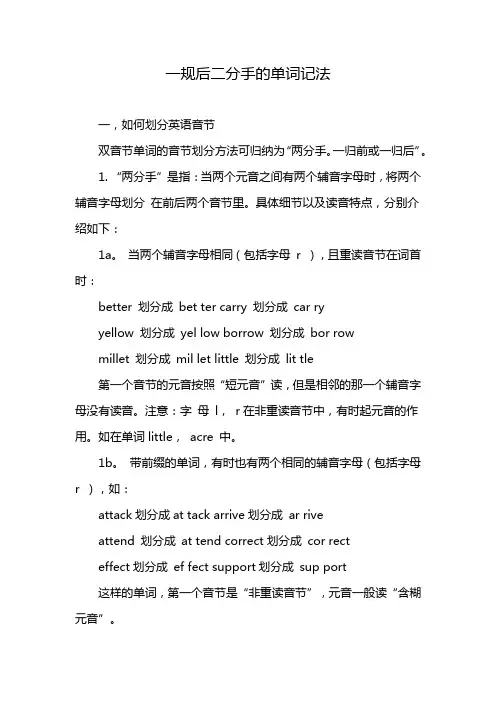
一规后二分手的单词记法
一,如何划分英语音节
双音节单词的音节划分方法可归纳为“两分手。
一归前或一归后”。
1.“两分手”是指:当两个元音之间有两个辅音字母时,将两个辅音字母划分在前后两个音节里。
具体细节以及读音特点,分别介绍如下:
1a。
当两个辅音字母相同(包括字母r ),且重读音节在词首时:
better 划分成bet ter carry 划分成car ry
yellow 划分成yel low borrow 划分成bor row
millet 划分成mil let little 划分成lit tle
第一个音节的元音按照“短元音”读,但是相邻的那一个辅音字母没有读音。
注意:字母l,r在非重读音节中,有时起元音的作用。
如在单词little,acre 中。
1b。
带前缀的单词,有时也有两个相同的辅音字母(包括字母r ),如:
attack划分成at tack arrive划分成ar rive
attend 划分成at tend correct划分成cor rect
effect划分成ef fect support划分成sup port
这样的单词,第一个音节是“非重读音节”,元音一般读“含糊元音”。
1c。
当两个辅音字母不同(不包括字母r )时:
sister 划分成sis ter window 划分成win dow
system 划分成sys tem publish 划分成pub lish
milky 划分成mil ky (建议将这个单词的读音与millet 的读音相比较。
)
第一个音节的元音按照“短元音”读,相邻的辅音字母有读音。
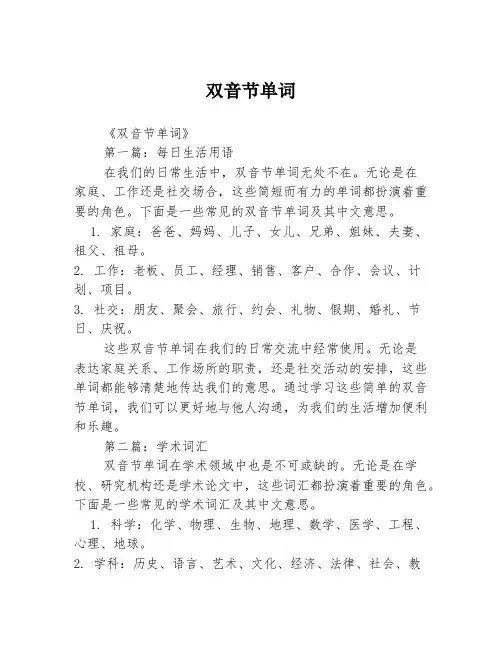
双音节单词《双音节单词》第一篇:每日生活用语在我们的日常生活中,双音节单词无处不在。
无论是在家庭、工作还是社交场合,这些简短而有力的单词都扮演着重要的角色。
下面是一些常见的双音节单词及其中文意思。
1. 家庭:爸爸、妈妈、儿子、女儿、兄弟、姐妹、夫妻、祖父、祖母。
2. 工作:老板、员工、经理、销售、客户、合作、会议、计划、项目。
3. 社交:朋友、聚会、旅行、约会、礼物、假期、婚礼、节日、庆祝。
这些双音节单词在我们的日常交流中经常使用。
无论是表达家庭关系、工作场所的职责,还是社交活动的安排,这些单词都能够清楚地传达我们的意思。
通过学习这些简单的双音节单词,我们可以更好地与他人沟通,为我们的生活增加便利和乐趣。
第二篇:学术词汇双音节单词在学术领域中也是不可或缺的。
无论是在学校、研究机构还是学术论文中,这些词汇都扮演着重要的角色。
下面是一些常见的学术词汇及其中文意思。
1. 科学:化学、物理、生物、地理、数学、医学、工程、心理、地球。
2. 学科:历史、语言、艺术、文化、经济、法律、社会、教育、政治。
3. 研究:理论、实验、数据、调查、结果、分析、结论、公开、评论。
这些双音节单词在学术界被广泛使用,用于描述不同学科的范畴、方法和成果。
通过学习这些学术词汇,我们可以更好地理解各个领域的知识,从而拓宽我们的学术视野,提高自己的专业能力。
双音节单词在日常生活和学术领域中都扮演着重要的角色。
通过学习这些单词,我们可以更好地理解和应用它们,提高自己的沟通和研究能力。
无论是与他人交流还是进行学术研究,双音节单词都是我们必不可少的工具。
让我们继续努力学习和应用这些简单而强大的词汇,为我们的生活和学术之旅增添色彩和启迪。
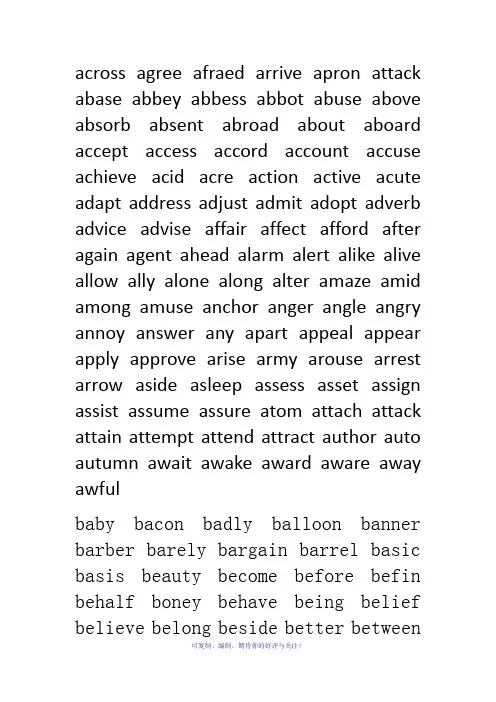
across agree afraed arrive apron attack abase abbey abbess abbot abuse above absorb absent abroad about aboard accept access accord account accuse achieve acid acre action active acute adapt address adjust admit adopt adverb advice advise affair affect afford after again agent ahead alarm alert alike alive allow ally alone along alter amaze amid among amuse anchor anger angle angry annoy answer any apart appeal appear apply approve arise army arouse arrest arrow aside asleep assess asset assign assist assume assure atom attach attack attain attempt attend attract author auto autumn await awake award aware away awfulbaby bacon badly balloon banner barber barely bargain barrel basic basis beauty become before befin behalf boney behave being belief believe belong beside better betweenbeyond biscuit bitter blackboard bloody border borrow bother bottom breakfast brother bucket budget bullet burden bury business busy butcher butter buttoncabbage cabin camel campus canal cancel cancer candy capture carbon career cargo carpet carriage carrot carry cartoon cassette ceiling cement center certain chapter charter chicken cigar circuit civil clever clinic cloudy clumsy collapse collect college column combat combine comfort comment commerce commit common compel compete complain compose compound compress compress comprise conceal concede concept concern copcert conclude condemn condense conduct confess confine confirm confront confuse connect conquer conscious consent consist constant consult consume contain contact contain copper corner correct costly cotton counter country county courage cover create creature credit crisis critic crucial culture cupboard currentDdaily dairy damage darling data daylight decade deceive decide decline decrease defeat defect defind define degree dlete delight dental deny depart depend depress derive descend desert design despite dessert detect device devise devote dictate differ dinner direct dirty discard discuss disease disgust dislike display dispose distant distress disturb diverse divide doctor dollar dozen dramaearly earnest easy effort elbow elect email elect elder emerge emit empty enough entry envy erect error escape estate even event ever every exam exact exceed except express extend extent eyesightfabric factor fairly fairy famine fancy farmer farther fashion fetal fatal fasten faulty feather feedback figure filter final finger finish focus follow foolish football footstep forbid forehead forest forgive forget forest formal format former fortune forward fraction fragment framework freedom friendly frighter fulfill function funny furnace further future gallon garage garden gather given global glory golden goodness govern graceful grateful greedy greenhouse grocer guidance guideline guiltyhabit himself herself handbay handful handy happen happy harbor hardly hardship hardware harness harvest hatred hazard headache heading headline healthy heaven heavyhello holy homework honest honey honor hopeless hostel housewife human hurry handless hundred idealignore illness immense impact imply import impose impress incline include income increase indeed index indoor infant infect infer inform injure inner input insert inside insight insist inspect instance instant instead instruct insult intend intense interest invade invent invest invite involve inward island item itself jacket jealous journey judgment justicekeyboard kilo kingdom kitchen kindess konwledgelabor ladder lightly landlord landscape largely laser lady largely laser lately later latter laughter laundry lawyer lazy leader leading learned leather lecture legal lessonletter lifetime lightning likely lobby local locate logic lonely loosen lorry lover lovelyluckymachine madam magnet magic mailbox manland maintain major manage mankind manner many margin market marriage married marry massive master matter mature meaning meantime meanwhile measure medal media meeting member mention menu mercy merely message meter method meter metric midday midnight million minro minus minute mirror mislead missile mirror mislead missile missing mission mister mobile model modern modest moment Monday money,monkey,moral mostly motion motive motor movement movie murder mushroom myselfnamely narrow nation nature naval navy nearly nearby neglect Negro nephew nervous network never nightmare nonsense normal northeast northern northwest notebook notion novel nowhere nuclear number nylonobey object oblige order obvious obstacle observe occur ocean oldness offence offer often okay omit oneself onion only onto open oppose potion oral orbit orange organ other outcome outdoor outer outlet outline outlook output outset outside outward oval oven over owing ownerpackage packet painful painter palace panel paper parade parcel pardon parent partly partisl partner patient pattern payment peaceful peasant pencil penny pension pepper perceive percent perfect perform perhaps permit persist personpersuade petrolthoto picnic picture pigeon pillar pilot pity planet paastic picture pigeon pillar pilot pity planet plastic playground pleasant pleasure plenty pocket poison polish polite pollute porter portion portrait possess possible postage postman poster portpone powder practice precious precise predict preface prefer prepare presence preserve pressure pretend pretty prevail prevent previous principle prison private probable problem proceed product program progress project promise promote pronoun proper propose prospect protect protest provde province provoke public publish punish pupil purchase purposequestionrabbit racial radar railroad railwayrainbow raincoat react reader reading ready really realize reason rebel recall receipt receive recent reckon record reduce refer refine reflect reform refresh refuse regard region regret reject relate relax release remain remark remind remote render renew repair replace reply report request require rescue research reserve resign resist tesort respect respond response restless testore restrain restrict result resume retail retain retire retreat return reveal reverse review revise revolt reward rhythm ribbon rigid rival river rocker roller ruler rotate routine rubber rubbish rumor ruralsafety sailor salad salesman sanction sandwich saucer sausage saving scarcely scatter scholar scissors season second secret section sector secure segment seldom select selfish senate senior sentence servant service session settement seversl severe shadow shelter shiver shortage shortly shoulder sideways siganl silent silly silver simply sincere sister slender soccer social soda sofa softwaresolar soldier solemn solind somehow someone something sometime somewhere somewhat sorrow sorry southeast sothwest southern speaker special spider spirit spokesman sponsor sportsman standard statement static station statue status steady steamer sticky stomach storage storey story structure student study stupid subject submerge submit subtract suburb subway succeed success sudden suffer sugar suggest summit summer sunset sunrise superb supper supply support suppose supreme surface surplus surprise surround survey survive suspect sustain swallw sweater symbol systemturtle tailor talent targer taxi tedious temper tender tennis tension terror textbook textile theatre theory thereby thirsty thorough thousand thunder ticket tidy tigertiny tissue title today topic torture total toward tractor traffic transfer transform translate transmit transport treasure treatment treaty trumpet truly tunnel turbine tutorugly under undo unit unite unless unlike unload until upon upper upright upset upstairs upward useful user utmost uttervacant vacuum valid valley value vanish napor vary venture version very vibrate victim village virtue vitalvividwaiter waitress waken wander wallet water weaken weaver weakness wealthy weapon weather weekday weekend weekly welcome welfare western shisper wholly widen widely widow winter winner window wisdom wildlife witheraw within without withstand witness woman wonder wooden woolen workman workshop worldwide worry worship worthless worthwhile worthy writer workmateyellow youngster youthful yearlyzero(注:文档可能无法思考全面,请浏览后下载,供参考。
英语单词大全:rave结尾的单词解析本文介绍了以rave结尾的英语单词的含义、用法和例句,以及它们与其他词缀的关系。
本文共分为四个部分,分别是:以rave结尾的单音节单词以rave结尾的双音节单词以rave结尾的多音节单词以rave结尾的其他形式本文旨在帮助读者了解和掌握这些单词,提高英语水平。
1. 以rave结尾的单音节单词以rave结尾的单音节单词有以下几个:单词词性含义例句rave v.狂热赞扬;胡言乱语;发疯;n.狂热赞扬;狂欢派对He raved about the new restaurant. 他对新餐厅赞不绝口。
She raved like a madwoman. 她像个疯婆子一样胡言乱语。
They went to a rave last night. 他们昨晚去参加了一个狂欢派对。
brave adj.勇敢的;无畏的;n. 勇士;勇敢的人;v. 勇敢地面对;不顾He is a brave soldier. 他是一名勇敢的士兵。
She was the only brave who dared tochallenge him. 她是唯一敢于挑战他的勇士。
They braved the storm and continuedtheir journey. 他们不顾暴风雨,继续了他们的旅程。
crave v.渴望;渴求;恳求She craved his attention. 她渴望得到他的注意。
He craved for a cup of coffee. 他渴求一杯咖啡。
They craved mercy from their captors. 他们向俘虏者恳求怜悯。
grave adj.严重的;严肃的;n. 坟墓;墓地;v. 雕刻;铭记This is a grave matter that requires careful consideration. 这是一个严重的问题,需要仔细考虑。
He spoke with a grave voice. 他用严肃的声音说话。
双音节同音不同义的英语单词Dual-Syllable English Words That Are Homophones but Not Synonyms.The English language is rich and diverse, offering a vast array of words that can be both intriguing and challenging. Among these words, a unique subset exists where two or more words sound identical but have different meanings. These are known as homophones. When considering dual-syllable homophones that are not synonyms, we encounter a fascinating landscape of words that, despite their similar sound, convey distinct concepts or ideas.One such pair is "write" and "right". The word "write" refers to the act of putting pen to paper or using adigital device to compose text. It is associated with the creation of written communication. On the other hand, "right" can refer to what is morally or ethically correct, as well as being spatially correct or accurate. For instance, we might say, "I have the right to express myopinion" or "That's the right answer." These two words,while sounding identical, convey entirely different meanings.Another example is "sea" and "see". "Sea" refers to the vast expanse of saltwater that covers much of the Earth's surface. It evokes images of waves, ships, and the vastness of the ocean. In contrast, "see" refers to the ability to perceive something visually or to understand something intellectually. We might say, "I see the boat on the horizon" or "I see what you mean." Again, these words share the same pronunciation but have distinct meanings.Another intriguing pair is "know" and "no". "Know"refers to having information or understanding of something, while "no" is a negative response indicating the absence of something or the rejection of a statement. For instance, we might say, "I know the answer to that question" or "No, I cannot do that." These words, while sounding the same,carry vastly different meanings and functions in a sentence.Another set of dual-syllable homophones is "fair" and"fare". "Fair" can refer to something that is equitable, just, or pleasant to look at. It might be used in a sentence like, "She has fair skin" or "It was a fair game." On the other hand, "fare" typically refers to the cost of public transportation or the general well-being of someone, as in "How much is the fare to the next stop?" or "She bid them a fond farewell."These examples demonstrate the richness and complexity of the English language. While these dual-syllable homophones may sound identical, their meanings and usage in sentences are distinctly different. Understanding these nuances is crucial for effective communication and avoiding misunderstandings.In conclusion, the English language is filled with fascinating examples of words that sound the same but have different meanings. The dual-syllable homophones discussed here, such as "write" and "right," "sea" and "see," "know" and "no," and "fair" and "fare," are just a few examples of this phenomenon. Understanding these words and their distinct meanings is essential for accurate and effectivecommunication in English. By exploring and appreciating these linguistic curiosities, we can deepen our understanding of the rich and diverse nature of the English language.。
单词划分音节的基本规则一、单音节词。
单音节词本身就是一个音节,不需要划分。
例如:- cat [kæt] n.(名词)猫。
- dog [dɒg] n. 狗。
- red [red] adj.(形容词)红色的。
二、双音节词。
1. 一般规则。
- 重音在前一音节的双音节词,一般从两个元音字母之间划分音节。
- 'hap - py ['hæpɪ] adj. 快乐的。
- 'pen - cil ['pensl] n. 铅笔。
- 重音在后一音节的双音节词,划分时一般将第一个音节作为一个整体,后面的音节为另一个部分。
- be'gin [bɪ'ɡɪn] v.(动词)开始。
- pre'sent [prɪ'zent] v. 赠送;['preznt] n. 礼物;adj. 现在的。
2. “辅音字母 + le”结尾的双音节词。
- 前面的辅音字母与前面的元音字母划为一个音节,“le”单独为一个音节。
- 'ap - ple ['æpl] n. 苹果。
- 'ta - ble ['teɪbl] n. 桌子。
3. “元音字母组合 + 辅音字母 + e”结尾的双音节词。
- 元音字母组合与前面的辅音字母划为一个音节,最后的“e”不发音,单独作为一个音节的结尾。
- 'name - ly ['neɪmli] adv.(副词)即,也就是。
- 'late - ly ['leɪtli] adv. 最近。
三、多音节词。
1. 一般规则。
- 含有三个或三个以上音节的词,一般有一个重读音节,其他为非重读音节。
划分音节时,要兼顾元音字母组合等情况。
- 'fam - i - ly ['fæməli] n. 家庭。
- 'beau - ti - ful ['bjuːtɪfl] adj. 美丽的。
单词重读音节划分的规则一、单音节词。
单音节词本身就是重读音节,不需要划分。
例如:- cat [kæt] (n. 猫)- dog [dɒg] (n. 狗)- pen [pen] (n. 钢笔)二、双音节词。
1. 一般情况。
- 名词、形容词、副词等双音节词,重音通常在第一个音节。
- 'father ['fɑːðə(r)] (n. 父亲)- 'happy ['hæpi] (adj. 快乐的)-'slowly ['sləʊli] (adv. 缓慢地)- 动词双音节词,重音常常在第二个音节。
- be'gin [bɪ'ɡɪn] (v. 开始)- pre'fer [prɪ'fɜː(r)] (v. 更喜欢)2. 有前缀或后缀的双音节词。
- 带有a -,be -,de -,re -,in -,ex -等前缀的双音节词,重音一般在第二个音节。
- a'go [ə'ɡəʊ] (adv. 以前)- be'come [bɪ'kʌm] (v. 变成)- de'cide [dɪ'saɪd] (v. 决定)- re'turn [rɪ'tɜːn] (v. 返回)- in'clude [ɪn'kluːd] (v. 包括)- ex'cept [ɪk'sept] (prep. 除……之外)- 以 - ee,- ese,- eer,- oon等结尾的双音节词,重音在最后一个音节。
- em'ployee [ɪmˈplɔɪiː] (n. 雇员)- Chi'nese [ˌtʃaɪˈniːz] (n. 中国人;adj. 中国的)- en'gineer [ˌendʒɪˈnɪə(r)] (n. 工程师)- af'ternoon [ˌɑːftəˈnuːn] (n. 下午)三、多音节词。
英语双音节词英语是世界上最广泛使用的语言,也是国际交流中最重要的语言。
在英语学习中,学习双音节词是一项必要的任务。
英语双音节词是英语最基本的一部分,也是英语学习的重要组成部分,需要注意的是,双音节词的发音非常重要,以正确的发音来表达词义,才能正确表达。
英语双音节词指的是以两个元音开头,以一个辅音结尾的单词,主要分为开合口双音节词和闭口双音节词。
开合口双音节词指的是以元音/a/,/e/,//,//开头,以辅音//,//,/d/,/k/或/t/或/s/结尾的双音节词。
这些双音节词的发音是将前面的元音和后面的辅音合成一个发音,如果发音不正确,往往会使话语不通顺。
一些常见的开合口双音节词有:rain /ren/刮雨,Friday /frade/星期五,house /has/房子,toast /tst/吐司等等。
闭口双音节词指的是以辅音/p/,/f/,/θ/,/k/,/t/,/s/开头,以元音//,//,/u:/,//结尾的双音节词,这些双音节词发音时,需要将前面的辅音和后面的元音分开发音,发音要清晰,发音间的停顿要恰当。
一些常见的闭口双音节词有:plant /pl:nt/植物,flower /fla/花,button /btn/按钮,tiger /tag/老虎等等。
英语双音节词的发音是非常重要的,要想口语流利,就一定需要正确发音。
英语双音节词的发音,可以采用看视频、听语音等方法来学习,定期复习,加强熟练,只有这样,才能在口语中正确地表现出来。
在背诵双音节词时,除了重视正确发音外,还应注意把握词义。
英语双音节词的学习必须牢记,掌握词意,才能在发音之外,把握词义,才能使双音节词的理解更为准确。
另外,英语双音节词不能仅仅片面重视词发音,还应注重句发音,把句子中的双音节词按照正确的顺序和语调来发音,以使句子听起来更加通顺,更加融洽。
综上所述,英语双音节词是英语学习的重要部分,学习双音节词要注重发音和词义,要扎实掌握,只有这样才能让双音节词的发音和词义更加熟练,更加准确,这样才能够在口语中正确表达。
jacket chicken ticket pocket hockey lucky duckling stomach photo dolphin guitar porridge message village sausage giraffe foreign concert dancing office pencil police decide receive bicycle ketchup kitchen action station social special ready heavy weather ahead instead water other honey mother monkey country Monday nothing enough daisy rainy waitress crayon Sunday again afraid explain today subway eighty neighbor Monday Friday eighteen easy peanut pleased reason season teacher either receive believe cyclist July reply myself tonight over only open borrow elbow follow sorrow ago argue awful autumn August naughty early dirty thirty thisrty Thursday surprise thirteen cloudy loudly trousers mountain thousand around careful prepare joyful enjoy actor active angry action actress album athlete basket carrot carry camping dancer faster hamster happen channel lantern glasses magic mango mascot matter planet plaster plastic practice salad taxi traffic travel entry better clever desert dentist jelly ketchup helpful heavy feather headache healthy suggest any insect lesson letter member message measure never pepper present question reptile seldom terrible rectangle welcome many into bigger clinic dizzy finish fifty finger hippo ticket wizard litter lizard mirror picnic quickly river Britain sixty physics Sydney history Christmas busy minute common concert dollar donkey forest hockey hobby lobster model modern pocket polish problem washing orange honest follow sorrow ugly butter cuddly culture funny hurry lucky mustard number puppy rubbish Sunday tunnel trumpet honey Monday money worried worry country cousin younger sailor waiter waitress player April crazy lazy nature paper station Asia famous sleepy sleeping easy leader reading meter pretty secret even ninety hiking pilot quiet rider silence cycling Thailand over older donuts poster robot lower slowly snowy doughnut shoulder ocean program useful during future student stupid Europe Tuesday Arctic artist hardly garden sharpen argue order corner also always warning daughter naughty German nervous perfect person dirty thirty curtain turkey Thursday early towel tower cloudy loudly cookies rooster doing movie woman pudding bushes careless careful nearly noisy toilet。